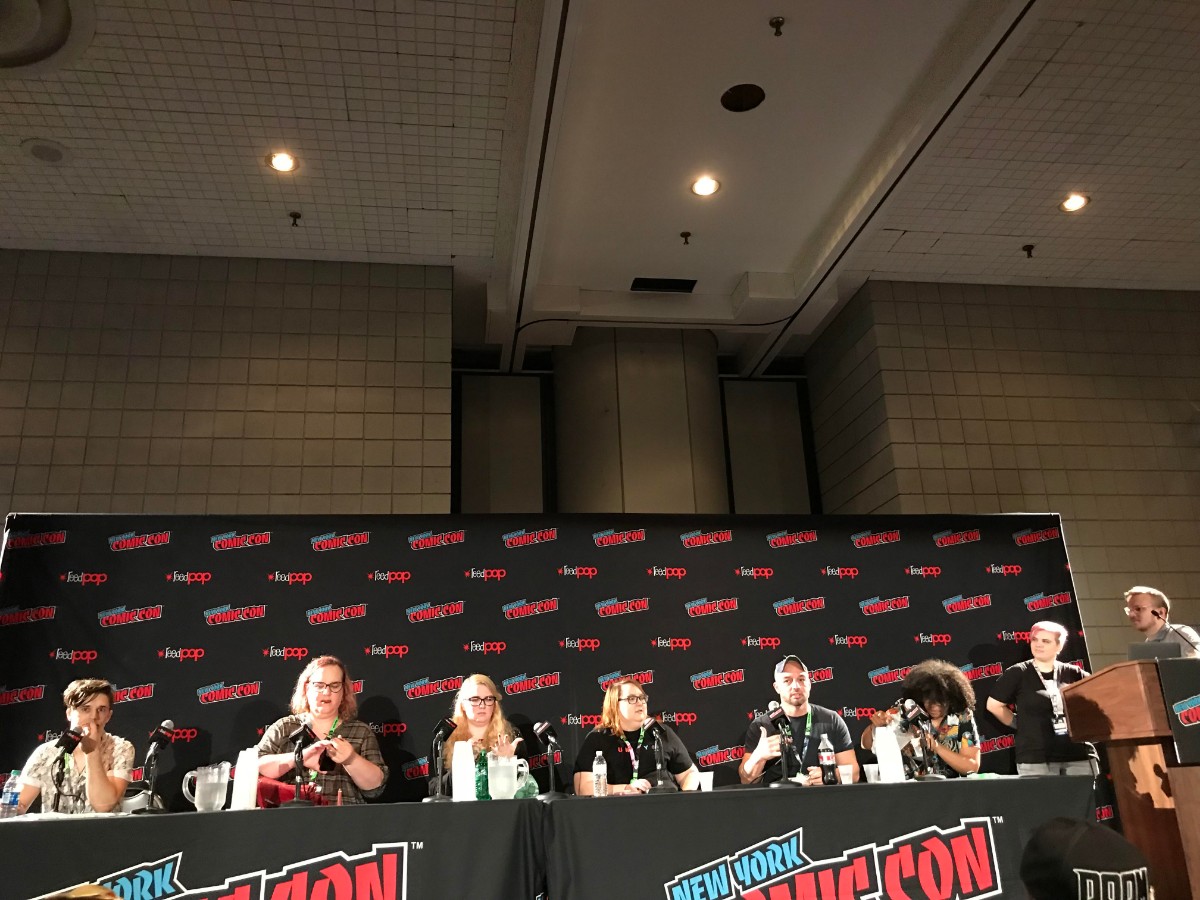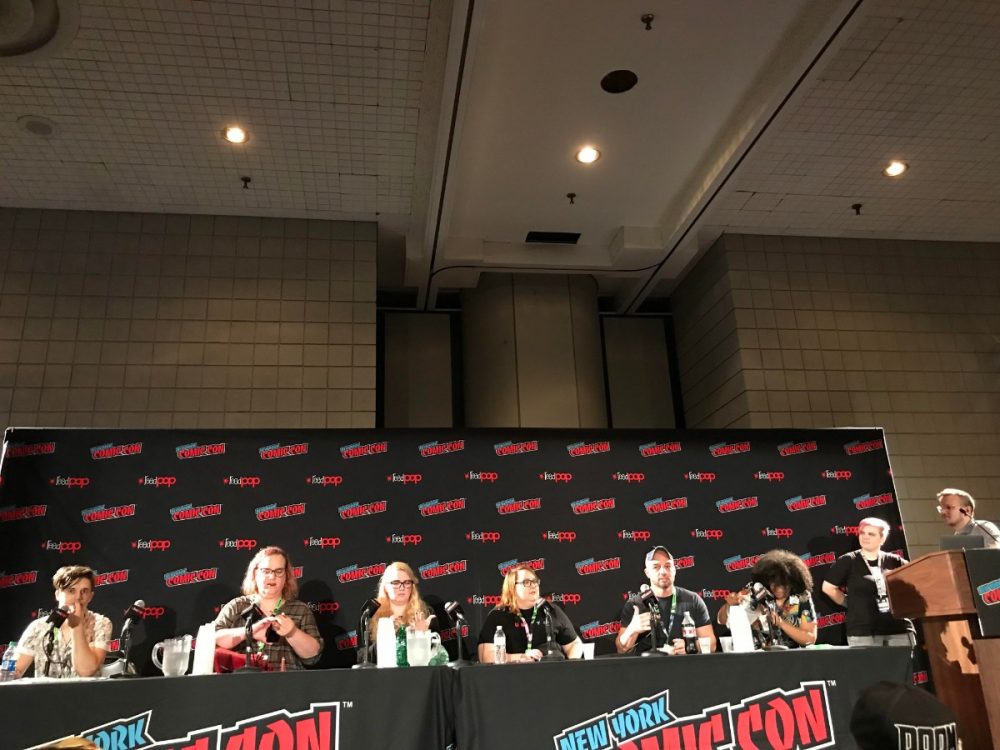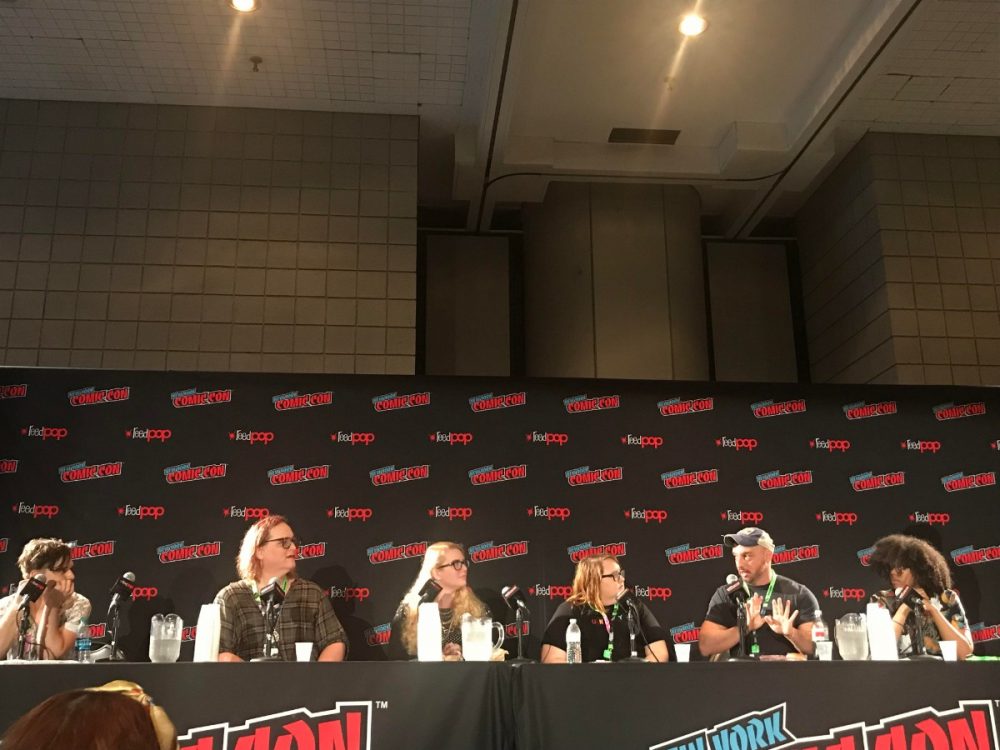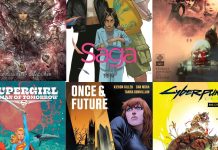By William Henderson
Should stories in comic books reflect what’s happening in the world or should they reflect the world in which the creators want to live? That question was one of several big questions posed by panellists at the Entertainment is LGBTQ panel, co-hosted by BOOM! Studios and the Gay & Lesbian Alliance Against Defamation (GLAAD) on Thursday at New York Comic Con.
The panel, moderated by Steve Foxe of Paste Magazine, featured queer creators Marguerite Bennett (Mighty Morphin’ Power Rangers), Phil Jimenez (Wonder Woman), Andy Mientus (who appeared on the CW’s The Flash and wrote The Backstagers and the Ghost Light), Lilah Sturges (Lumberjanes), Vita Ayala (The Wilds), and GLAAD Director of Entertainment Research & Analysis Megan Townsend. And for an hour, panelists weighed in on the number of similar panels taking place at comic conventions around the country, the value in finding and seeing someone like you in your favorite comic book, and their earliest memories of identifying with queer characters in pop culture.
The panelists agreed that it’s hard to create, or maybe even to be alive, and not be affected by the world in which we live. Jimenez described hearing from other comic book creators that their productivity has deceased over the last couple of years, and how he even wonders occasionally why he’s drawing comic books and “not storming the White House.”
But he’s drawing comic books because the stories he tells need to be told. And other queer creators are working in comic books because their stories need to be told, and, they agreed, are being told more often today than ever before.
Ayala, a former comics retailer who spent a large part of their 10 years in the business forced to recommend the same one or two titles to anyone looking for a book with queer content, said that readers today can essentially find most types of queer stories. No longer are you limited to just one or two titles; now you can walk into a comic book store, tell a retailer the type of story you want to read, and the retailer can recommend a book that tells that type of story and that features a queer character.
But there are pros and cons to getting less pushback from publishers. Take Bennett’s 133-issue run on DC Bombshells. While she was never told she couldn’t feature queer characters (and if you’ve read one or more of the issues, you know that most of the cast is queer), she ended up defending writing decisions that resulted in one or more of the characters sad or hurt.
“It wasn’t just going to be carousels the whole time,” she quipped, adding that she had to include conflict to have a story.
But that’s a nice position in which to be, and certainly not one that Sturges, when she was younger, expected to find in a comic book. She couldn’t find a book that starred (or just included) a transgender character. She recalled, when pitching a comic book with a transgender character, that the story would have worked better in the 90s, as if being transgender was a “90s fad.”
And now she’s being told that publishers want to hear her voice and want her to tell the stories she wants to tell. Such as when she thought a story “was too gay,” and she was told that there is “no such thing as too gay.”
This type of inclusivity is rather novel, at least to the panelists. They described expecting pushback from publishers, steeling themselves for it even, and realizing that the pushback just wasn’t coming – or isn’t coming the way it used to come.
“It’s 20-gayteen,” said Ayala, who described the value in stories that presented queer characters with empathy, explicitness, and the idea “that this is just how it is.”
Except maybe it’s time to jettison the “queer trauma” story said Mientus, who played the Pied Piper on “The Flash,” a character who was kicked out of his home after his parents discovered he was gay, and who, in turn, became a villain.
He described the characters in Backstagers, many of whom are queer, and how their queer identity is not an essential part of the story at all; they just are who they are.
Asked about queer characters they saw reflected in popular culture when they were younger, Mientus pointed to the Broadway show “RENT,” Bennett to Harley Quinn and Poison Ivy (though she admitted that she maybe had shipped the pair long before creators like her explored their dynamic), Ayala to “Xena the Warrior Princess,” and Jimenez to the Lynda Carter “Women Woman” and Buck Rogers TV series.
“Wonder Woman and Buck Rogers cemented my career goals and my man goals,” said Jimenez, who is currently working with Kelly Sue DeConnick on a Wonder Woman book for DC’s new Black Label line of comics.
Townsend brought up a recent GLAAD study that found queer representation in films released in 2017 was the lowest it has been in seven years, as in 14 out of 120 films had at least one LGBTQ character. 2018, she added, is looking a bit better, with films like “Love, Simon” and “Crazy Rich Asians” prominently including queer characters, and this is where panellists encouraged the audience of about 150 people to continue supporting queer creators and queer characters.
As the panel ended, the panellists recommended that the larger the audience for queer stories, the more queer stories publishers will support and promote.










